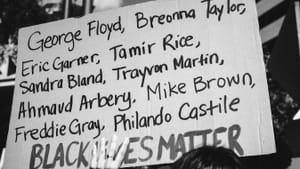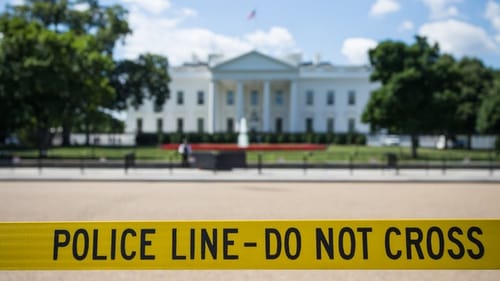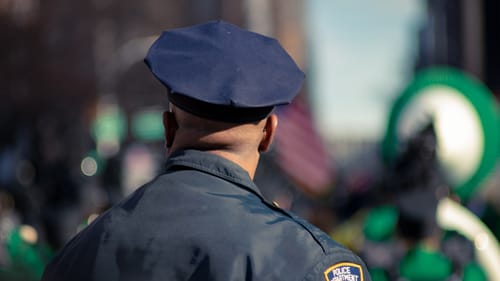Stay in the Loop
BSR publishes on a weekly schedule, with an email newsletter every Wednesday and Thursday morning. There’s no paywall, and subscribing is always free.
Protests are not enough
As protests against police brutality ignite, what can Black officers tell us?

When I was 11, I got in my first and only fight. After school at the Boys & Girls Club, I overheard a white girl call a Black boy the N-word. I’m biracial, and have always believed in racial equality. I didn’t understand how anyone could say such a hurtful, pejorative thing and how anyone could withstand that sort of abuse without retaliating. I asked the boy what he was going to do. He told me he couldn’t do anything. I could. I beat the girl up and was sent home for fighting.
At that time, I saw that moment as one in which I stood up for what was right and fought racism. What I didn’t realize then was that that incident was a microcosm of our world. A 12-year-old Black male child knew that if he verbally or physically defended himself against the assault of that bigoted girl, he would be the one to get in trouble.
Impossible to ignore
What happened between Amy Cooper and Christian Cooper in May is a grown-up version of the same dynamics of power and privilege that were operating between my after-school companions and that have been operating in our country since the days of the plantation—when a white woman’s word could result in a Black man’s death.
Most people who don’t have an in-depth understanding of the power structures that support and maintain systemic oppression think of racism as a question of morality and personal beliefs. They think that, if they have Black friends, are politically liberal, and think all humans are created equal, they’re not racist. But racism isn’t just a bunch of guys draped in white sheets because they’re too cowardly to show their faces marching down the street shouting hateful epithets.
The murders of George Floyd, Ahmaud Arbery, Breonna Taylor, and so many others made it impossible to ignore: white supremacy has so devalued Black lives that those entrusted to protect and serve could kneel on a man’s neck until he died (or watch someone do so without intervening), shoot an innocent jogger, or riddle an EMT’s body with bullets during a senseless and unnecessary raid.
Who gets a second chance?
Don’t think racism is systemic? Doubt that Blackness is being persecuted? Believe that the officers who kill innocent Black people are merely a “few bad apples”? Think again. Although Black people account for less than 14 percent of the US population, they make up approximately 40 percent of the people in our nation’s prisons. Black and Brown offenders are prosecuted differently than their white counterparts for the same crimes.
Earlier this year, I interviewed Senator Sharif Street of the Third Senatorial District of Philadelphia, and he offered an example.
Say you have some kids walking down the street from the neighborhood, poor, Black and Brown, and they get stopped by the cops. The system says, “We need to go ahead and prosecute these kids now for this marijuana crime to make sure that they don’t graduate to more serious drugs, so we need to send a message to them right now to save their lives.” And then you have the same exact situation, a couple of white college kids from Temple, upper-middle-class, get picked up for the exact same thing, the exact same amount of drugs, the system says, “We don’t want to ruin these kids’ lives by giving them a record for using marijuana, it’s not that serious, they have their whole lives ahead of them.”
I support the wave of protests sweeping the world and the Philadelphians who have taken to the streets en masse to shout “Black Lives Matter.” But, on its own, this is not and will never be enough.

Underlying trauma
Our police force is 77 percent white, and we do very little to work to identify the biases that are operating within the law-enforcement community. Furthermore, we fail to foster a sense of connection between white officers and Black citizens, and to practice for the racially charged incidents that will inevitably occur.
It’s no wonder that the Black community has been traumatized as a result of interactions with the police who (when it comes to Black offenders) presume guilt instead of innocence. Sadly, cops are also dealing with their own unaddressed trauma. Blue H.E.L.P., a nonprofit focused on police officers’ mental health, reported that a record number of current or former officers died by suicide in 2019. How many more officers suffer fragile mental health, live in a state of fight or flight, and cope with the pains and pressures of the job in ways that endanger or harm themselves or others?
And what happens when you give people in this prolonged state guns, nightsticks, and the power to enforce their biases with impunity? The result will be our current injustice. There has to be a better system.
Confronting bias
I sat down with Dr. Howard Stevenson, the executive director of the University of Pennsylvania’s Racial Empowerment Collaborative, whose work involves educating people about the nature of bias and enabling them to think through racist moments of the past and to prepare for these encounters in the future. He says his work with police has been shown highly effective in reducing violence against Black people by police during face-to-face encounters.
According to Stevenson, “We are trained to be in denial that racism is happening, and, also, that it is emotional, physiological, and cognitive.” He said the trauma-informed approach he uses to help police officers to confront their biases has made officers less likely to react in counterproductive or damaging ways during encounters with individuals.
Stevenson’s powerful TED Talk, “How to Resolve Racially Stressful Situations,” offers insights about the nature of racism and approaches to dealing with it. He describes his father’s approach to dealing with racism as akin to that of Martin Luther King Jr., and his mother’s as that of Malcolm X.
Today, we are seeing strategies of peace and strategies of violence employed throughout our city and our nation. The aggregate effect is that action is begetting action. But still missing is an effective long-term strategy for healing a broken system.

Black and blue
Speaking with Street and Stevenson, I believe that any attempt to make positive changes will involve hiring more Black officers and looking to our existing Black and Brown officers for their insights and advice. It is Black officers who have found it within themselves to reconcile their identities as Black and blue, to understand the broken system from within, and to see the humanity that could become possible if their voices were placed at the center of the conversation.
I sat down with a high-ranking Black police captain who spoke with me on the record, but wishes to remain anonymous to avoid professional backlash.
“From the day you walk into the police academy, until the day you graduate, it’s bred into you: ‘you’re blue, you’re blue, you’re blue,’” the captain says. “And then that mindset gets into you and then you have an occupation that is predominantly white. And then you have people of color who have a long history of injustices of law enforcement on public safety. So we constantly battle blue and Black.”
Black officers have had to grapple with their own biases while contending with a system that largely underestimates them. But they’re uniquely equipped to understand the struggles faced by Black people in their dealings with law enforcement, because Black and POC officers themselves contend with systemic racism.
The captain I interviewed says that white members of the force often don’t look past the race of non-white officers, and until they get deeply acquainted, they don’t realize that these officers have the ability and capacity to do every task in the job description. “They become so focused on the color of our skin that they bypass their ability to learn from us.”
So let’s learn from each other, understand the brokenness of our system, and look to those who have had the courage and the capacity to grapple with their own Blackness and blueness in order to truly protect and serve.
Sign up for our newsletter
All of the week's new articles, all in one place. Sign up for the free weekly BSR newsletters, and don't miss a conversation.
